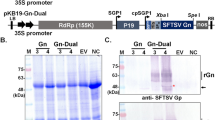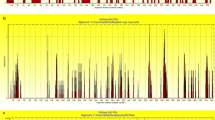Abstract
Bovine enterovirus (BEV) VP2 protein is a structural protein that plays an important role in inducing protective immunity in the host. The function of VP2 has been characterized, but there is little information on its B cell epitopes. Three monoclonal antibodies (mAbs) directed against BEV VP2 were generated and characterized from mice immunized with the recombinant VP2 protein. Three minimal linear epitopes 152FQEAFWLEDG161, 168LIYPHQ173, and 46DATSVD51 reactive to the three mAbs were identified using western blotting analysis. Three-dimensional model of the BEV-E virion and the VP2 monomer showed that epitope 152FQEAFWLEDG161 is exposed on surface of the virion and epitopes 46DATSVD51 and 168LIYPHQ173 are located inside the virion. Alignment of the amino acid sequences corresponding to the regions containing the three minimal linear epitopes in the VP2 proteins and their cross-reactivity with the three mAbs showed that epitope 168LIYPHQ173 is completely conserved in all BEV strains. Epitope 46DATSVD51 is highly conserved among BEV-E strains and partly conserved among BEV-F strains. However, epitope 152FQEAFWLEDG161 is not conserved among BEV-F strains. Using the mAbs of 3H4 and 1E10, we found that VP2 localized in the cytoplasm during viral replication and could be used to monitor the viral antigen in infected tissues using immunohistochemistry. A preliminary 3H4-epitope-based indirect ELISA allowed us to detect anti-BEV-strain-HY12 antibodies in mice. This study indicates that the three mAbs could be useful tools for investigating the structure and function of the viral VP2 protein and the development of serological diagnostic techniques for BEV infection.









Similar content being viewed by others
References
Abed Y, Wolf D, Dagan R, Boivin G (2007) Development of a serological assay based on a synthetic peptide selected from the VP0 capsid protein for detection of human parechoviruses. J Clin Microbiol 45(6):2037–2039. https://doi.org/10.1128/JCM.02432-06
Blas-Machado U, Saliki JT, Boileau MJ, Goens SD, Caseltine SL, Duffy JC, Welsh RD (2007) Fatal ulcerative and hemorrhagic typhlocolitis in a pregnant heifer associated with natural bovine enterovirus type-1 infection. Vet Pathol 44(1):110–115. https://doi.org/10.1354/vp.44-1-110
Blas-Machado U, Saliki JT, Sanchez S, Brown CC, Zhang J, Keys D, Woolums A, Harvey SB (2011) Pathogenesis of a bovine enterovirus-1 isolate in experimentally infected calves. Vet Pathol 48(6):1075–1084. https://doi.org/10.1177/0300985810395728
Boros A, Pankovics P, Knowles NJ, Reuter G (2012) Natural interspecies recombinant bovine/porcine enterovirus in sheep. J Gen Virol 93(Pt 9):1941–1951. https://doi.org/10.1099/vir.0.041335-0
Buttinelli G, Donati V, Ruggeri FM, Joki-Korpela P, Hyypia T, Fiore L (2003) Antigenic sites of coxsackie A9 virus inducing neutralizing monoclonal antibodies protective in mice. Virology 312(1):74–83
Chang J, Li Y, Yang D, Wang F, Jiang Z, Yu L (2013) VP1 B-C and D-E loops of bovine enterovirus cluster B can effectively display foot-and-mouth disease virus type O-conserved neutralizing epitope. J Gen Virol 94(Pt 12):2691–2699. https://doi.org/10.1099/vir.0.057745-0
De Palma AM, Thibaut HJ, van der Linden L, Lanke K, Heggermont W, Ireland S, Andrews R, Arimilli M, Al-Tel TH, De Clercq E, van Kuppeveld F, Neyts J (2009) Mutations in the nonstructural protein 3A confer resistance to the novel enterovirus replication inhibitor TTP-8307. Anti microb Agents Ch 53(5):1850–1857. https://doi.org/10.1128/AAC.00934-08
Dunne HW, Huang CM, Lin WJ (1974) Bovine enteroviruses in the calf: an attempt at serologic, biologic, and pathologic classification. J Am Vet Med Assoc 164(3):290–294
Earle JA, Skuce RA, Fleming CS, Hoey EM, Martin SJ (1988) The complete nucleotide sequence of a bovine enterovirus. J Gen Virol 69(Pt 2):253–263. https://doi.org/10.1099/0022-1317-69-2-253
Foo DG, Alonso S, Phoon MC, Ramachandran NP, Chow VT, Poh CL (2007) Identification of neutralizing linear epitopes from the VP1 capsid protein of Enterovirus 71 using synthetic peptides. Virus Res 125(1):61–68. https://doi.org/10.1016/j.virusres.2006.12.005
Frimann TH, Barfoed AM, Aasted B, Kamstrup S (2007) Vaccination of mice with plasmids expressing processed capsid protein of foot-and-mouth disease virus--importance of dominant and subdominant epitopes for antigenicity and protection. Vaccine 25(33):6191–6200. https://doi.org/10.1016/j.vaccine.2007.06.002
Gai X, Zhang Q, Lu H, Yang Z, Zhu L, Li X, Wang X (2018) A neonatal murine model for evaluation of enterovirus E HY12 virus infection and pathogenicity. PLoS One 13(2):e0193155. https://doi.org/10.1371/journal.pone.0193155
Galfre G, Milstein C (1981) Preparation of monoclonal antibodies: strategies and procedures. Method Enzymol 73(Pt B):3–46
Jiang H, Weng L, Zhang N, Arita M, Li R, Chen L, Toyoda T (2011) Biochemical characterization of enterovirus 71 3D RNA polymerase. BBA-Biomembranes 1809(3):211–219. https://doi.org/10.1016/j.bbagrm.2011.01.001
Jimenez-Clavero MA, Escribano-Romero E, Mansilla C, Gomez N, Cordoba L, Roblas N, Ponz F, Ley V, Saiz JC (2005) Survey of bovine enterovirus in biological and environmental samples by a highly sensitive real-time reverse transcription-PCR. Appl Environ Microb 71(7):3536–3543. https://doi.org/10.1128/AEM.71.7.3536-3543.2005
Joki-Korpela P, Roivainen M, Lankinen H, Poyry T, Hyypia T (2000) Antigenic properties of human parechovirus 1. J Gen Virol 81(Pt 7):1709–1718. https://doi.org/10.1099/0022-1317-81-7-1709
Kiener TK, Jia Q, Lim XF, He F, Meng T, Chow VT, Kwang J (2012) Characterization and specificity of the linear epitope of the enterovirus 71 VP2 protein. Virol J 9:55. https://doi.org/10.1186/1743-422X-9-55
King AMQ, Lefkowitz EJ, Mushegian AR, Adams MJ, Dutilh BE, Gorbalenya AE, Harrach B, Harrison RL, Junglen S, Knowles NJ, Kropinski AM, Krupovic M, Kuhn JH, Nibert ML, Rubino L, Sabanadzovic S, Sanfacon H, Siddell SG, Simmonds P, Varsani A, Zerbini FM, Davison AJ (2018) Changes to taxonomy and the international code of virus classification and nomenclature ratified by the international committee on taxonomy of viruses (2018). Arch Virol 163:2601–2631. https://doi.org/10.1007/s00705-018-3847-1
Ley V, Higgins J, Fayer R (2002) Bovine enteroviruses as indicators of fecal contamination. Appl Environ Microbiol 68(7):3455–3461
Li Q, Yafal AG, Lee YM, Hogle J, Chow M (1994) Poliovirus neutralization by antibodies to internal epitopes of VP4 and VP1 results from reversible exposure of these sequences at physiological temperature. Virol J 68(6):3965–3970
Liu C, Ihara T, Nunoya T, Ueda S (2004) Development of an ELISA based on the baculovirus-expressed capsid protein of porcine circovirus type 2 as antigen. J Vet Med Sci 66(3):237–242
Liu CC, Chou AH, Lien SP, Lin HY, Liu SJ, Chang JY, Guo MS, Chow YH, Yang WS, Chang KH, Sia C, Chong P (2011) Identification and characterization of a cross-neutralization epitope of Enterovirus 71. Vaccine 29(26):4362–4372. https://doi.org/10.1016/j.vaccine.2011.04.010
Liu D, Liu C, Hu J, Hang L, Li X, Wei Y, Zhu H, Zhang Q, Wang X (2018) Construction and evaluation of HA-epitope-tag introduction onto the VP1 structural protein of a novel HY12 enterovirus. Virology 525:106–116. https://doi.org/10.1016/j.virol.2018.09.010
Moll T, Davis AD (1959) Isolation and characterization of cytopathogenic enteroviruses from cattle with respiratory disease. Am J Vet Res 20:27–32
Nollens HH, Rivera R, Palacios G, Wellehan JF, Saliki JT, Caseltine SL, Smith CR, Jensen ED, Hui J, Lipkin WI, Yochem PK, Wells RS, St Leger J, Venn-Watson S (2009) New recognition of Enterovirus infections in bottlenose dolphins (Tursiops truncatus). Vet Microbiol 139(1–2):170–175. https://doi.org/10.1016/j.vetmic.2009.05.010
Park J, Kim S, Bang M, Lee K, Ko Y, Lee H, Shim H, Cho I (2009) Existence of antibodies against bovine enterovirus in humans and various animals in Korea. Korean J Vet Res 49:237–242
Schafer F, Seip N, Maertens B, Block H, Kubicek J (2015) Purification of GST-tagged proteins. Method Enzymol 559:127–139. https://doi.org/10.1016/bs.mie.2014.11.005
Simmonds P, Welch J (2006) Frequency and dynamics of recombination within different species of human enteroviruses. J Virol 80(1):483–493. https://doi.org/10.1128/JVI.80.1.483-493.2006
Smyth MS, Hoey EM, Trudgett A, Martin SJ, Brown F (1990) Chemically synthesized peptides elicit neutralizing antibody to bovine enterovirus. J Gen Virol 71 ( Pt 1):231–234. https://doi.org/10.1099/0022-1317-71-1-231
Smyth MS, Martin JH (2001) Structural, biochemical and electrostatic basis of serotype specificity in bovine enteroviruses. Arch Virol 146(2):347–355
Smyth MS, Trudgett A, Hoey EM, Martin SJ, Brown F (1992) Characterization of neutralizing antibodies to bovine enterovirus elicited by synthetic peptides. Arch Virol 126(1–4):21–33
Sobhy NM, Mor SK, Mohammed ME, Bastawecy IM, Fakhry HM, Youssef CR, Abouzeid NZ, Goyal SM (2015) Isolation and molecular characterization of bovine enteroviruses in Egypt. Vet J 206(3):317–321. https://doi.org/10.1016/j.tvjl.2015.10.011
Sukupolvi-Petty S, Austin SK, Engle M, Brien JD, Dowd KA, Williams KL, Johnson S, Rico-Hesse R, Harris E, Pierson TC, Fremont DH, Diamond MS (2010) Structure and function analysis of therapeutic monoclonal antibodies against dengue virus type 2. J Virol 84(18):9227–9239. https://doi.org/10.1128/JVI.01087-10
Sun J, Huang L, Wei Y, Wang Y, Chen D, Du W, Wu H, Feng L, Liu C (2015) Identification of three PPV1 VP2 protein-specific B cell linear epitopes using monoclonal antibodies against baculovirus-expressed recombinant VP2 protein. Appl Microbiol Biotechnol 99(21):9025–9036. https://doi.org/10.1007/s00253-015-6790-z
Thanongsaksrikul J, Srimanote P, Tongtawe P, Glab-Ampai K, Malik AA, Supasorn O, Chiawwit P, Poovorawan Y, Chaicumpa W (2018) Identification and production of mouse scFv to specific epitope of enterovirus-71 virion protein-2 (VP2). Arch Virol 163(5):1141–1152. https://doi.org/10.1007/s00705-018-3731-z
Thibaut HJ, De Palma AM, Neyts J (2012) Combating enterovirus replication: state-of-the-art on antiviral research. Biochem Pharmacol 83(2):185–192. https://doi.org/10.1016/j.bcp.2011.08.016
Wu CN, Lin YC, Fann C, Liao NS, Shih SR, Ho MS (2001) Protection against lethal enterovirus 71 infection in newborn mice by passive immunization with subunit VP1 vaccines and inactivated virus. Vaccine 20(5–6):895–904
Wu KX, Ng MM, Chu JJ (2010) Developments towards antiviral therapies against enterovirus 71. Drug Discov Today 15(23–24):1041–1051. https://doi.org/10.1016/j.drudis.2010.10.008
Xu J, Wang S, Gan W, Zhang W, Ju L, Huang Z, Lu S (2012) Expression and immunogenicity of novel subunit enterovirus 71 VP1 antigens. Biochem Biophs Res Commun 420(4):755–761. https://doi.org/10.1016/j.bbrc.2012.03.067
Zhang H, Liu H, Bao J, Guo Y, Peng T, Zhou P, Zhang W, Ma B, Wang J, Gao M (2014) Characterization of an Enterovirus species E isolated from naturally infected bovine in China. Virus Res 191:101–107. https://doi.org/10.1016/j.virusres.2014.07.032
Zhu L, Xing Z, Gai X, Li S, San Z, Wang X (2014) Identification of a novel enterovirus E isolates HY12 from cattle with severe respiratory and enteric diseases. PLoS One 9(5):e97730. https://doi.org/10.1371/journal.pone.0097730
Funding
This work was supported by grants from the National Natural Science Foundation of China (31572531), the National Key Research and Development Programs (2017YFD0500104, 2016YFD0500904, and 2017YFD0500903), and the Natural Science Foundation of Heilongjiang Province in China (C2015064).
Author information
Authors and Affiliations
Corresponding authors
Ethics declarations
The mouse experiments and the procedures used in this study followed standard protocols that were reviewed and approved by the Harbin Veterinary Research Institute of the Chinese Academy of Agricultural Sciences (Approval number Heilongjiang-SYXK-2006-032) and were strictly compliant with the requirements of the Animal Ethics Procedures and Guidelines of the People’s Republic of China.
Conflict of interest
The authors declare that they have no conflict of interest.
Additional information
Publisher’s note
Springer Nature remains neutral with regard to jurisdictional claims in published maps and institutional affiliations.
Electronic supplementary material
ESM 1
(PDF 343 kb)
Rights and permissions
About this article
Cite this article
Liu, D., Hu, J., Dong, H. et al. Identification of three linear B cell epitopes using monoclonal antibodies against bovine enterovirus VP2 protein. Appl Microbiol Biotechnol 103, 7467–7480 (2019). https://doi.org/10.1007/s00253-019-09971-0
Received:
Revised:
Accepted:
Published:
Issue Date:
DOI: https://doi.org/10.1007/s00253-019-09971-0




